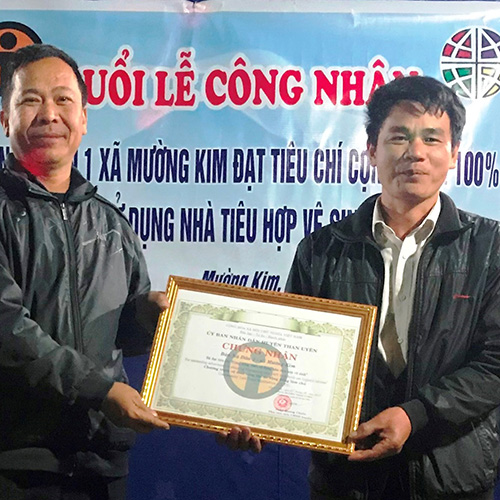Stories of Change

Lo Van Nhoi, right, receives the village Open Defecation Free certificate for display in the village.
CWS efforts in Vietnam positively impacted 40,036 people in 69 communities last year.
A village achieves Open Defecation Free status in Vietnam
“Just last year, there were only about 20 families using sanitary latrines. As the head of the village, I wanted to encourage other families to do so as well, but it was hard, and I did not know how to do it efficiently. When I heard that CWS would work with villages in the commune, I was glad to be chosen to join the four-day training course about Community-Led Total Sanitation, which I came to see was a very efficient method for mobilizing people to improve their knowledge and change their attitudes and thinking for safer behavior.”
Lo Van Nhoi is the young leader of Na Dan #1 village in Vietnam. After he attended that CLTS training course, he immediately registered with his commune’s People’s Committee to have a community sanitation start-up event in Na Dan #1. The event was a big success. These events are designed to shock people about the dangers of open defecation, and that certainly happened here. Nhoi’s friends and neighbors were surprised to learn that open defecation is responsible for transmitting diseases into the environment and then to them and, especially, to their children. They knew that they had to do something.
The start-up event was followed by a sanitary latrine-building session in the village. That way people had hands-on experience as well as the confidence and motivation – including accountability from their neighbors – to build family latrines.
Fast forward to August 2018, when Tran Van Thang, a CWS field-based project officer, joined the celebration at Na Dan #1 as they received their certification as an Open Defecation Free village. Thang could see the happiness and excitement on the face of each person present, including Nhoi.
With the ODF certification comes a small cash award, which the people of Na Dan #1 decided to use to purchase new tables and chairs for their community meeting space. “It is great that we could decide together what we needed the most, and we all wanted tables and chairs so we can use our Culture House more often for meetings and gatherings, instead of having to impose on one family to use their house, which we used to have to do,” Nhoi explained.
Reflecting on the success of Na Dan #1, Nhoi says, “I see once again that donor support for sanitary latrine promotion is not only for healthier living environments and good basic hygiene, but is also a catalyst for us to return to help facilitate more community development in the future.”
